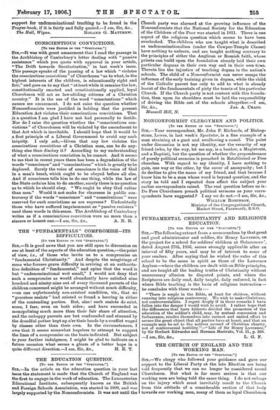CONSCIENTIOUS CONVICTIONS.
[To THE EDITOX 07 THE " SPECTATOR:1
Sra,—It was with great amazement that I read the passage in the Archbishop of Canterbury's letter dealing with "passive resistance" which you quote with approval in your article, " The Drift towards Secularisation," in last week's issue. This passage speaks of the passing of a law which "violates the conscientious convictions" of Churchmen "as to what, in the highest interests of the children, is educationally right and fair," and goes on to say that "at least while it remains the law, constitutionally enacted and constitutionally applied, loyal Churchmen will act as law-abiding citizens of a Christian country." It is the use of the word "conscientious" which causes me amazement. I do not raise the question whether Nonconformists were justified in holding that the present Education Act violates their conscientious convictions. That is a question I am glad I have not had personally to decide. Nor do I raise the question whether the "conscientious con- victions" of Churchmen will be violated by the amendment to that Act which is inevitable. I should hope that it would be a first principle of a Liberal Government to avoid any such iniquity. I only ask,—Given that any law violates the conscientious convictions of a Christian man, can he do any- thing else than disobey it ? According to my understanding of what a conscientious conviction is, he cannot. And it seems to me that in recent years there has been a degradation of the words "conscience" and "conscientious" which is greatly to be deplored. Surely the voice of conscience is the voice of God in a man's heart, which ought to be obeyed before all else. And if conscience tells him to do one thing, while the law of the State ordains him to do another, surely there is no question es to which he should obey. "We ought to obey God rather than men." Would it not make for clearness in public con- troversy if the words " conscience " and " conscientious " were reserved for such convictions as are supreme ? Undoubtedly those who have suffered imprisonment as "passive resisters" used these words in this sense. The Archbishop of Canterbury writes as if a conscientious conviction were no more than a sincere or honest one.—I am, Sir, &c., A. N. B.










































 Previous page
Previous page